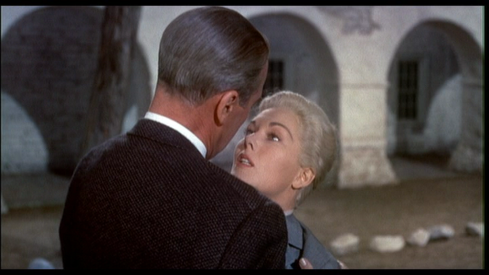VERTIGO
(director: Alfred Hitchcock; screenwriters: from the novel D’entre les Morts by Pierre Boileau & Thomas Narcejac/Samuel Taylor/Alec Coppel; cinematographer: Robert Burks; editor: George Tomasini ; music: Bernard Herrmann; cast: James Stewart (Det. John ‘Scottie’ Ferguson), Kim Novak (Madeleine Elster/Judy Barton), Barbara Bel Geddes (Marjorie ‘Midge’ Wood), Tom Helmore (Gavin Elster), Henry Jones (Coroner), Ellen Corby (Manager of McKittrick Hotel), Lee Patrick (Car owner mistaken for Madeleine), Paul Bryar (Det. Capt. Hansen); Runtime: 128; MPAA Rating: PG; producer: Alfred Hitchcock/James C. Katz; Universal Home Entertainment; 1958)
“Alfred Hitchcock at his most disturbing.”
Reviewed by Dennis Schwartz
Brilliant slow moving psychological drama about a man obsessed by a strange love for an ice queen blonde, who suffers from a mental breakdown, a bad guilt trip and is seemingly possessed by the dark side of his mind. It’s Alfred Hitchcock at his most disturbing, raising what seems to be his own personal demons as he questions how love can be a matter of lust and manipulation. Hitchcock adapted it from the French novel D’entre les morts by Pierre Boileau & Thomas Narcejac; the writers are Samuel Taylor and Alec Coppel. Bernard Herrmann provides a riveting score. It’s set in a foggy and alluring San Francisco that has plenty of Old World charm, appealing deserted residential streets, and a Golden Gate bridge that seems scary as a landmark.
San Francisco detective John ‘Scottie’ Ferguson (James Stewart) is chasing a criminal along a rooftop, but his fear of heights (called acrophobia) takes root and inadvertently causes his colleague to fall to his death. The bachelor John quits the force, confers with longtime platonic friend Marjorie ‘Midge’ Wood (Barbara Bel Geddes) about getting help for his problem, and accepts a snooping job with an old college chum he hasn’t seen for ages Gavin Elster (Tom Helmore). He’s to follow his rich gorgeous wife Madeleine (Kim Novak), whose shipping company he runs, not because she’s unfaithful but because she’s suicidal. Madeleine becomes unconscious and possessed by another woman, who committed suicide at 26, the same age she now is. The detective is asked “Do you believe that someone dead, someone out of the past, can take possession of a living being?” John takes the unorthodox job and follows his prey to the cemetery at Mission Dolores where her ghost is buried, the art museum where there’s a portrait of her ghost and a hotel which was once her ghost’s home. John saves Madeleine when she jumps into the San Francisco Bay, and falls madly in love with her. When she climbs a church bell-tower and jumps to her death, his fear of heights phobia kicks in again and he can’t help. Suffering a mental breakdown and institutionalized for the past year, the lovesick despondent retired detective when released wanders the streets looking for Madeleine and mistakenly meets many such women until he locates Judy Barton. She looks like Madeleine and he begins a tentative relationship with her, where he starts out by taking her to the same restaurant he dined with Madeleine. John obsessively gets Judy to look exactly like Madeleine; in a chilling shopping scene he bullies her into getting the same dresses Madeleine wore. It shows the domineering male at his worst, trying to make his love conform to what he envisions she should be like.
Hitchcock forgoes his usual suspense (he gives the twist ending away before the climax) and instead masterfully presents an eerie scenario of a psychologically distraught man caught in a dizzying whirlpool of exploitation and obsession, who lives in a dark dream world where his love is a form of necrophilia for his dreamgirl and he wants only a second chance to redeem himself in the real world.
An animated and edgy Stewart and an icy Novak are perfect for their roles, as each conforms to their character’s faults. In 1996 a new print of Vertigo was released, it restored the original quality of the colors and was digitally enhanced. Over the years the reputation of this film has grown, where upon its release it was not acclaimed by critics it now is considered in the company of H.’s best films–certainly one of his most personal and complex.

REVIEWED ON 2/15/2006 GRADE: A